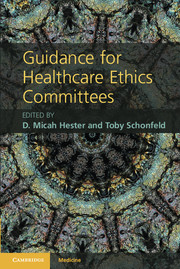Book contents
- Frontmatter
- Contents
- Contributors
- Preface
- Section 1 The Context of Healthcare Ethics Committee Work
- 1 Introduction to healthcare ethics committees
- 2 Brief introduction to ethics and ethical theory
- 3 Healthcare ethics committees and the law
- 4 Cultural and religious issues in healthcare
- Section 2 Consultation
- Section 3 Policy Development and Organizational Issues
- Section 4 Educating Others
- Index
- References
4 - Cultural and religious issues in healthcare
Published online by Cambridge University Press: 05 August 2012
- Frontmatter
- Contents
- Contributors
- Preface
- Section 1 The Context of Healthcare Ethics Committee Work
- 1 Introduction to healthcare ethics committees
- 2 Brief introduction to ethics and ethical theory
- 3 Healthcare ethics committees and the law
- 4 Cultural and religious issues in healthcare
- Section 2 Consultation
- Section 3 Policy Development and Organizational Issues
- Section 4 Educating Others
- Index
- References
Summary
Objectives
Appreciate the profound inluence culture has on how an individual approaches the healthcare encounter.
Describe how religious and cultural commitments may give rise to value tensions in healthcare.
Understand the role that HEC members play in eliciting and addressing culturally relevant values of both patients and healthcare providers.
Case
Ms. A, 19, presents to the Emergency Department (ED) of a local hospital with high fever, cough, and a generally despondent demeanor. She is diagnosed with tuberculosis (TB), treated, and given a prescription for and information about the proper TB treatment regimen. Upon mandatory contact investigation fromthe county health department, Ms. A’s father is identified as also having active tuberculosis.
Neither Mr. A nor his daughter are taking their TB medications routinely. Ultimately, they are both involuntarily committed to the appropriate institution (which was close to where they lived) for mandatory TB treatment. By this point, Ms. A had to be rolled into the institution on a gurney, while her father, though also ill, was ambulatory.
Adding to the complexities of this case was the fact that Mr. A and his daughter were both migrant workers who spoke very little English. Determining the precise dialect of Mixteca that they spoke and obtaining an appropriate interpreter was neither a quick nor an easy process. While in the hospital, on several occasions Mr. A attempted to remove the PIC line through which his daughter was receiving her TB medications. Healthcare team members were unsure why Mr. A was refusing medication that could so easily help his daughter, and uncertain as to how best to proceed in light of the current conflict.
- Type
- Chapter
- Information
- Guidance for Healthcare Ethics Committees , pp. 25 - 31Publisher: Cambridge University PressPrint publication year: 2012



